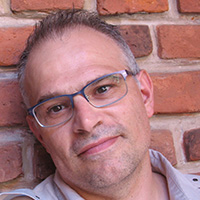 Carlo Cecchetto è professore ordinario all’Università degli Studi di Milano-Bicocca (3 mesi all’anno) e direttore di ricerca presso il CNRS francese (Unità di ricerca “Structures Formelles du Langage” a Parigi, 9 mesi all’anno).
Carlo Cecchetto è professore ordinario all’Università degli Studi di Milano-Bicocca (3 mesi all’anno) e direttore di ricerca presso il CNRS francese (Unità di ricerca “Structures Formelles du Langage” a Parigi, 9 mesi all’anno).
Dopo gli studi post-laurea alle università di Milano e di Ginevra, ha avuto lavori di ricerca e insegnamento presso il San Raffaele di Milano, la Kanda University di Tokyo e l’Università degli Studi di Siena. I suoi interessi di ricerca includono la sintassi delle lingue naturali, lo studio dell’interfaccia sintassi-semantica, il ruolo della memoria a breve termine nella comprensione linguistica e la linguistica e la psicolinguistica delle lingue dei segni.
Negli ultimi dieci anni ha pubblicato articoli sulle principali riviste del settore (incluse Language, Linguistic Inquiry, Natural Language Semantics, Natural Language and Linguistic Theory, Syntax, Lingua, Applied Psycholinguistics, Cognition, Cortex, Journal of Cognitive Neuroscience, Neuropsychologia, Cognitive Neuropsychology, Experimental Brain Research, Journal of Deaf Studies and Deaf Education e Aphasiology). Ha curato diversi volumi ed è co-autore di una monografia per MIT Press.
Attualmente coordina un gruppo di lavoro (“working package”) nel progetto Horizon 2020 SIGN-HUB (“The Sign Hub: preserving, researching and fostering the linguistic, historical and cultural heritage of European Deaf signing communities with an integral resource”).